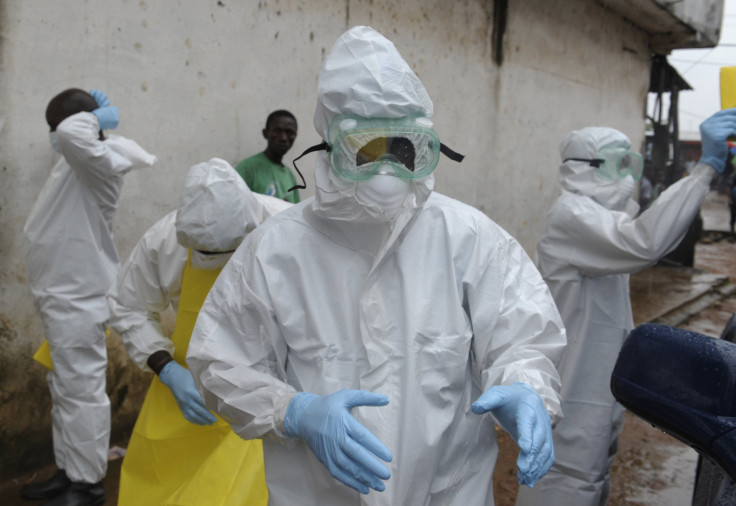Ebola Outbreak: 'Huge Need' For Funding, Supplies, Says UN Agency

The Ebola outbreak currently ravaging West Africa continues to spread at an alarming rate, and the World Health Organization says that hospital beds, supplies and transportation are all in short supply. The United Nations agency announced last week that it had developed a $490 million program for the U.N.’s network of agencies to implement. But that money is not immediately available because the WHO is “badly” funded, spokesman Dan Epstein told the International Business Times on Monday.
The funding shortfall and persistent logistical issues mean that victims of the deadly hemorrhagic fever and the health care professionals who treat them have not had access to all of the specialized equipment and support required to provide proper care.
“We need at least 980 more beds in Ebola treatment centers. There’s a huge need for foreign medical teams in these countries, and we also need personal protective equipment and other supplies,” Epstein said.
“We need hundreds of thousands of protective suits. We assume we need seven suits per bed per day … So we assume that we need 300,000 personal protective suits per month. We have shipped out 240,000 this month, so we’re short 60,000.”
The global public health organization Doctors Without Borders has also raised alarms about the inadequate resources dedicated to the fight against the Ebola scourge.
"Six months into the worst Ebola epidemic in history, the world is losing the battle to contain it. Leaders are failing to come to grips with this transnational threat," Dr. Joanne Liu, international president of the group, said during a Sept. 2 briefing before the United Nations, adding that her staff in Africa is "completely overwhelmed" by the outbreak.
The WHO, which gets most of its funding from contributions by the governments of U.N. member states, is also in dire need of vehicles, Epstein said. The agency hires residents of the areas of Guinea, Liberia, Sierra Leone, Nigeria and Senegal struck by the disease to help with transport-related activities.
Locals are paid to collect and bury the bodies of dead Ebola victims, to drive ambulances, and even to ride motorcycles on the rutted roads between remote villages to monitor people who have been in contact with suspected and confirmed Ebola victims.
Once the victims get to the often-rudimentary, open-air field hospitals rapidly erected in communities hit by the disease, they are sometimes turned away due to the lack of beds and resources -- no matter how sick they may be, the Wall Street Journal reported Sunday. The Journal reported that right now “there are only a few hundred beds,” despite the fact that WHO estimates that the outbreak could eventually infect 20,000 people.
"It is impossible to keep up with the sheer number of infected people pouring into facilities. In Sierra Leone, infectious bodies are rotting in the streets," Liu said in her Sept. 2 remarks. "Rather than building new Ebola care centers in Liberia, we are forced to build crematoria."
The dearth of beds is driven by the convergence of multiple factors. First is the fact that the disease has moved from the tiny rural villages it typically affects into major cities like Nigeria’s teeming capital, Lagos, Epstein said, which allows for it to spread faster and more easily. Those factors, combined with the reluctance of some victims to promptly check into treatment facilities when they experience symptoms, led the WHO to upgrade the outbreak to the heightened Public Health Emergency of International Concern status last month.
“It wasn’t really driven by the numbers so much as by the increase in transmission, and also the types of transmission,” Epstein explained. “It wasn’t in isolated villages anymore, now we’re seeing intense transmission in cities and there’s hidden transmission where people are not coming forward in time for treatment. So what we’re seeing is we have a huge shortage at treatment centers.”
The cash flow issue at the WHO is driven in part because as a U.N. agency it has difficulty accepting donations and thus cannot fill its coffers by hosting big-ticket events or employing other traditional fundraising tactics. It can accept contributions from other agencies or accept donations through foundations connected to regional offices, but a concerned citizen cannot simply send a $50 check to the WHO’s headquarters or log onto its website and contribute $10 via PayPal, Epstein said.
“I think that WHO can also accept donations from non-state actors, basically like NGOs and individuals, but my understanding is that they haven’t worked out the details,” he said. But if a wealthy benefactor wanted to pitch in $100 million, the organization “would find a way to say yes.”
WHO statistics show that as of Sept. 5 there had been 2,097 deaths across Guinea, Liberia and Sierra Leone, with 3,944 confirmed cases in those four countries, while in Nigeria there had been 21 cases and seven deaths and in Senegal there had been one confirmed case and two possible ones.
© Copyright IBTimes 2025. All rights reserved.





















